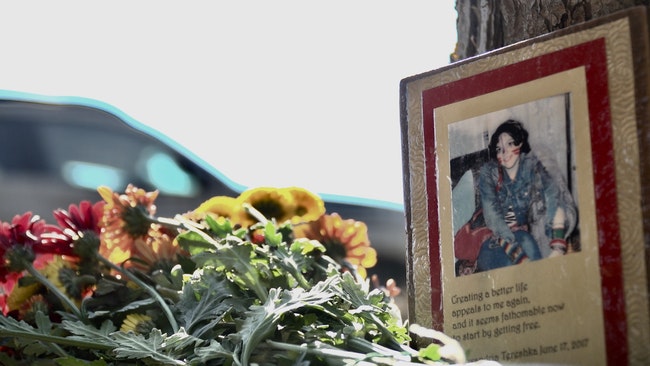
A roadside memorial for Alexandra Tereshka is along Oregon Highway 22, where she died in 2018. (Kate McMahon/Independent Lens (PBS)
Oregon this week takes the first step toward diverting more drug abusers from jail to clinics.
Is the state’s treatment machinery ready?
For weeks, reporters Rachel Alexander and Saphara Harrell have been digging in to answer that.
You will see the results of their investigation on Wednesday.
But readers also will see the result of a remarkable partnership.
The investigative report will be accompanied by the release of a documentary film about one life.
Salem Reporter teamed up with Independent Lens (PBS), a national home for independent documentaries.
The documentary, “The D.A.’s Dilemma,” is the work of Kate McMahon, a veteran producer from Portland. McMahon has produced documentaries for PBS Frontline and others. She started her career in 1998 as an associate producer for “The NewsHour with Jim Lehrer.” She also has worked directly with Salem Reporter from time to time.
This time, McMahon reached back to a story that remains haunting to this day – the 2018 death of Alexandria Tereshka.
Here’s how reporter Troy Brynelson, at the time with Salem Reporter and now with OPB, wrote about her in May 2019.
“Sometime that Saturday night in November, 27-year-old Alexandria Tereshka, clutching a folder of court records and contact information for doctors, lay down in a lane of the busy state highway,” the story said.
She was killed.
Her death at the time drew brief notice, but Salem Reporter was determined not to let it pass without more caring attention. Our news team obtained 700 pages of government medical and court records and police reports. Interviews followed.
“A portrait emerged of a woman beset by major depression and unshakable addiction to methamphetamine, of a patient in and out of a public system that at times didn’t have services open that she needed,” the story continued.
McMahon returns to Alexandria’s story in remarkable recorded interviews with her family and with Aaron Felton, Polk County district attorney. They all talk about the help Alexandria needed.
The full documentary will be available online with our package on Wednesday.
 Aaron Felton, Polk County district attorney, discusses challenges for the criminal justice system in dealing with addicts in the documentary “A D.A’s Dilemma.” (Kate McMahon/Independent Lens (PBS)
Aaron Felton, Polk County district attorney, discusses challenges for the criminal justice system in dealing with addicts in the documentary “A D.A’s Dilemma.” (Kate McMahon/Independent Lens (PBS)
The team at Independent Lens and ITVS approached Salem Reporter last fall, suggesting a collaboration to produce impactful journalism in words and in video. We readily agreed, knowing from our own experience of McMahon’s skill. ITVS has another Oregon connection. One of its board members is Andrew DeVigal, chair of Journalism Innovation and Engagement at the University of Oregon.
Independent Lens “supports collaborations between local filmmakers and journalists looking at a range of issues, with a focus since 2019 on inequities in our criminal justice system,” said Stephen Talbot, senior producer of documentary shorts at Independent Lens. “We began with a series about the role of sheriffs in rural America and now are exploring district attorneys because they command so much authority — deciding if and when to prosecute a case, negotiating plea deals, and determining whether someone should be diverted to a treatment program.”
Talbot said the partnerships “aim to fill gaps in local journalism coverage at a time when many news organizations are struggling or even disappearing. Independent filmmakers work in partnership with respected news outlets like the Salem Reporter to better inform local communities and encourage dialogue and discussion about the most pressing social issues of our time.”
 Kate McMahon, independent documentary film producer.
Kate McMahon, independent documentary film producer.
While McMahon patiently developed the documentary, Alexander and Harrell set out to assess Oregon’s ability to treat more addicts.
Most of the headlines about Measure 110, passed by voters last fall, focused on the controversial part. Oregon became the first state to reduce criminal penalties for possession of small amounts of drugs such as heroin, cocaine, and methamphetamines.
What got less attention was the other half of the bargain – those who might ordinarily end up with a criminal conviction instead get the chance to treat their addictions.
That could mean thousands of people moving into Oregon’s treatment system. To assess how that system will handle its expanded duty, our reporters reviewed data and government reports. Alexander and Harrell interviewed government officials, treatment experts and advocates for better care.
The result is a fact-packed investigative report you won’t want to miss. We hope you will see that drug use is not just someone else’s personal challenge. Addiction and its catalog of allied troubles impact every household, every business, every organization in Salem.
Our intent is that readers understand what’s at stake. We hope legislators will consider the findings in our package and move beyond platitudes. And we hope that state leaders, from Gov. Kate Brown on down, see the clear needs ahead and respond.
Les Zaitz is editor of Salem Reporter. Contact him by email at [email protected].
YOU CAN SUPPORT THIS KIND OF WORK
Salem Reporter relies on community support to fund vital local journalism. You can help us do more projects like this.
SUBSCRIBE: A monthly subscription starts at $5 a month.
GIFT: Give someone you know a subscription.
ONE-TIME PAYMENT: Contribute, knowing your support goes towards more local journalism you can trust.









